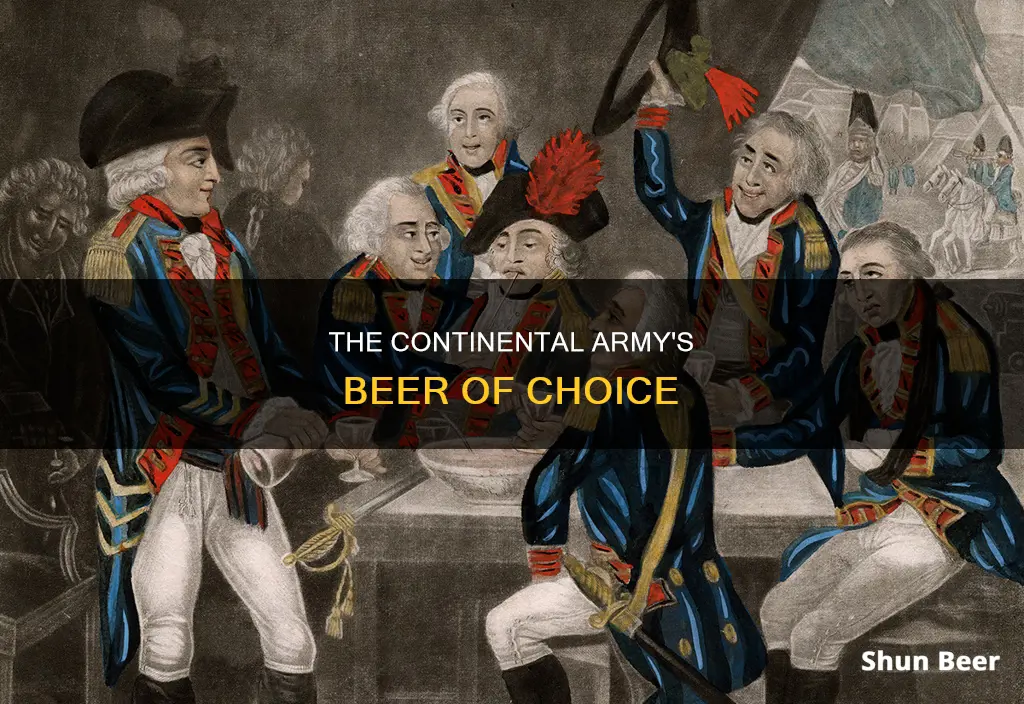
The Continental Army drank spruce beer during the Revolutionary War. The Continental Congress stipulated that a soldier's daily ration must include a quart of spruce beer or cider. Spruce beer was chosen because it was believed to be a solution to soldiers' scurvy woes. The beer was made from spruce trees found in North America and was used by the British during the French and Indian War.
| Characteristics | Values |
|---|---|
| Type of Beer | Spruce Beer |
| Alcohol Content | 3.2% ABV |
| Amount Consumed | Up to a quart a day |
| Purpose | To prevent scurvy |
| Other Armies that Consumed Beer | British Army, US Army, Russian Army |
What You'll Learn

Spruce beer was used to prevent scurvy
Spruce beer was used by the British during the French and Indian War, and this practice continued into the American Revolution. The Continental Army was ordered to drink up to a quart of spruce beer each day to ward off scurvy. The disease, commonly associated with pirates, is caused by a vitamin C deficiency and can lead to anemia, oozing sores, tooth loss, and delayed healing of injuries.
Spruce beer was made from the plentiful spruce trees found in North America. It was an effective solution to the Continental Army's scurvy woes, and its use continued into the Civil War. However, as rations evolved and dehydration and freeze-drying technology improved, the need for spruce beer waned as troops could now carry compact and safely stored fruits and vegetables.
Drinking Beer While on Macrobid: What You Need to Know
You may want to see also

George Washington understood the benefits of beer for morale
George Washington understood the importance of beer for morale when he commanded the Continental Army during the Revolutionary War. According to historian Gregg Smith, Washington's ability to locate encampments within reach of a supply of beer was one of his "most valuable skills".
Indeed, beer was crucial to keeping the troops content. The Continental Congress stipulated that a soldier's daily ration must include a quart of spruce beer or cider. Spruce beer, in particular, was essential to solving soldiers' scurvy woes. The disease, caused by vitamin C deficiency, could lead to anemia, oozing sores, tooth loss, and delayed healing of injuries. Spruce trees, which were plentiful in North America, provided the key ingredient for this beer.
The use of spruce beer to prevent scurvy was not a new idea during the Revolutionary War. Explorer Jacques Cartier and his men, for example, learned from the Huron in the 1700s to use tree bark to brew teas and concoctions to stay healthy. Similarly, Swedish-Finnish botanist Pehr Kalm observed how locals avoided scurvy by drinking beer brewed from spruce branches.
The British also understood the benefits of beer for their troops. During the French and Indian War, British General James Murray wrote in a general order that spruce beer be made a ration requirement, stating:
> [T]he visible effects of the… hemlock-spruce, which has been given, for some time, to the scorbutic men in the hospitals, put it beyond doubt, that it must also be the best preservative against the scurvy, and, as the lives of brave soldiers are ever to be regarded with the utmost attention, it is ordered that the regiments be provided with a sufficient quantity of that particular spruce, which each corps must send for occasionally, and it is to be made into a liquor, according to the method with which the Surgeons are already acquainted, and the commanding officers must be answerable that their men drink of this liquor, at least twice every day, mixed with their allowance of rum.
The practice of providing spruce beer to troops continued into the American Revolution, where the Continental Army was ordered to drink up to a quart of spruce beer each day.
Beer and Colonoscopy Prep: Is It Safe?
You may want to see also

Beer was rationed to soldiers during the Civil War
Beer was a staple drink for soldiers during the Civil War, with the Continental Army drinking up to a quart of spruce beer each day. Spruce beer, made from the plentiful spruce trees in North America, was an effective solution to the soldiers' scurvy woes, as it provided them with much-needed vitamin C. The practice of drinking spruce beer dates back to the Vikings and was later adopted by explorers and settlers in the New World.
During the Civil War, the U.S. Army continued the tradition of brewing and drinking spruce beer, recognizing its health benefits. The beer was also used as a form of currency, with "sutler's tokens" being used to purchase it. Beer was so valued that large American breweries set aside 15% of their annual production for the troops. The beer was shipped in olive drab-colored cans to avoid detection by snipers.
The Continental Army's daily ration of spruce beer was not just a matter of taste or tradition but also of strategic importance. George Washington, the commander of the Continental Army during the Revolutionary War, was known for his skill in locating encampments within reach of a supply of beer. This ensured a steady supply of beer for his troops, boosting morale and providing health benefits.
The distribution of beer to soldiers during the Civil War had a significant impact on the American beer industry. The breweries that supplied the Army gained influence, and lager beer, with its mild taste and low alcohol content, became increasingly popular. The Army's endorsement of lager beer as a healthy beverage contributed to its widespread acceptance.
However, the Civil War also saw the rise of prohibitionist sentiments and the establishment of dry camps. This led to a compromise, with the Army allowing the sale of lager beer with an alcohol content of 3.2% or less. This compromise satisfied both those who favored temperance and those who recognized the importance of beer for soldier morale.
Beer and Birth Control: Is It Safe to Mix?
You may want to see also

Beer was also rationed during World War II
During the American Revolution, the Continental Army was ordered to drink up to a quart of spruce beer each day. Spruce beer, made from the plentiful spruce trees found in North America, was the only solution to solving soldiers' scurvy woes. The disease is caused by vitamin C deficiency and can lead to anemia, oozing sores, tooth loss, and delayed healing processes for injuries.
In the years following the turn of the twentieth century, temperance organizations in the United States built upon decades of activism to demand federal legislation to rid the nation of alcohol. With the outbreak of World War I, temperance organizations took aim at the German immigrants running breweries in cities like Milwaukee and St. Louis. Many of the immigrants, who fled Europe in the wake of the failed Revolutions of 1848, carried the German tradition of beer brewing to the American cities where they settled. The anti-German sentiment took an especially dark turn on April 4, 1918, when a German immigrant named Robert Prager was lynched in Collinsville, Illinois.
Two months after Armistice Day, the Eighteenth Amendment was ratified on January 16, 1919, and legal beer brewing in the US came to a halt. In 1933, one month after Franklin Delano Roosevelt’s presidential inauguration, the US Congress passed the Twenty-First Amendment, designed to repeal the Eighteenth. FDR signed the Cullen-Harrison Act, which legalized the sale of beer containing up to 3.2 percent alcohol by weight.
Eight years after the repeal of Prohibition, the United States entered World War II. The US military landed on the side of providing alcohol to its ranks, and the US government instructed the brewing industry to allocate 15 percent of its products for the troops to ensure that beer could be provided to them. The ABV of beer sold to American service members would remain limited to 3.2 percent.
In 1942, British brewers created the "Beer for the Troops" committee. They organized supplies for soldiers even in the most remote areas of the Middle East and North Africa. After the successful landing in Normandy in 1944, beer was delivered to the soldiers' camps in barrels tied to the wings of airplanes. In 1944, the British Royal Navy approved a new plan to provide beer to sailors in the Pacific Ocean. With the help of engineers, Bristol breweries developed a plan for "floating breweries" that could produce about 40,000 liters of beer per week. In the summer of 1945, two such breweries began to be built, but the war ended before they could be put to use.
Understanding Beer Extracts: The Science Behind the Brew
You may want to see also

Beer was used as a means of control by the military
During the Revolutionary War, George Washington, the first president of the United States, recognised the importance of beer to his troops and strategically set up camp within reach of a supply. The Continental Congress also stipulated that a soldier's daily ration must include a quart of spruce beer or cider. Spruce beer was used to combat scurvy, a disease caused by vitamin C deficiency, which could lead to death. The beer was made from spruce trees found in North America and was used by both the British and the Continental Army.
In the 19th century, beer was also used as a means of control in the Civil War camps, which were officially dry. However, soldiers spent their wages on illegal whiskey sold by "dog robber" sutlers, leading to drunkenness and health issues. The army found a solution in lager beer, which was considered non-intoxicating and was exempt from prohibition laws due to its low alcohol content. Lager was introduced to the camps and became a compromise between the prohibitionists and those who wanted alcohol, keeping soldier morale high.
During World War II, the U.S. government also recognised the importance of beer to its troops and declared beer production an essential wartime industry, with 15% of its output reserved for the military. Beer was seen as a "force multiplier", and large breweries like Anheuser-Busch and Miller set aside a portion of their production for the troops.
The distribution of beer by the military was often used as a tool to influence behaviour and opinion. For example, during World War II, commanders learned that serving lager would keep their men on base and away from local women, easing relationship problems with surrounding communities.
In addition to its use as a means of control, beer also held cultural significance for soldiers. For instance, the Turners, a group of German immigrants who were influential in the Union Army during the Civil War, drank lager as part of their cultural traditions, which included gymnastics and political discussions.
Overall, beer played a significant role in the military as a means of control, influencing behaviour, boosting morale, and maintaining health. It was a valuable tool for leaders to manage and direct their troops.
Beer After Running: Good Idea or Not?
You may want to see also
Frequently asked questions
The Continental Army drank spruce beer during the Revolutionary War.
Spruce beer was used to prevent soldiers from getting scurvy, a disease caused by vitamin C deficiency.
Yes, the Continental Army was also issued rations of rum or whiskey.







